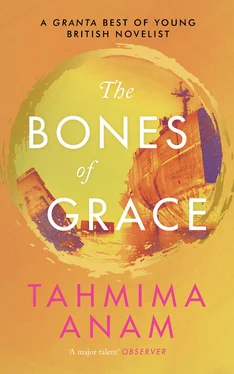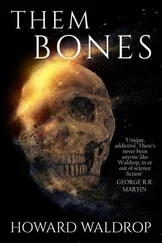Jimmy said, ‘When I was in Afghanistan, I passed out at least a dozen times. This kind of dry heat can kill you.’
Zamzam finished making up my saline water and dropped the flask beside my sleeping bag.
I was eager for them to go, but they seemed to want to stay until I’d finished eating. I took a bite of bread and felt it turning back into dough in my mouth. ‘What was it like out there, in the war?’ I asked.
‘Paid off my loans,’ Jimmy said.
‘My dad was in the army once,’ I offered.
‘Was he a Mukti Bahini?’ Zamzam asked.
I nodded, surprised he knew the Bengali word for ‘freedom fighter’. ‘Bangladesh used to be a part of Pakistan,’ I explained to Jimmy. ‘My father was in the war of independence.’
‘Fighting for a cause.’ Jimmy said. ‘Wish I knew what that was like.’
I put the plate down and took a large gulp of saline, its sweet saltiness reminding me of the time I had contracted food poisoning from eating a stick of roadside sugar cane. ‘Thank you,’ I said. ‘I feel better.’
Zamzam put his hand to his forehead in a gesture of farewell. I recognised something — a mournful yet euphoric expression I often caught on my parents’ faces, the look of a person who believed they could remake the world. I sometimes thought, when I looked at Zamzam, that he was trying to tell me something. But I was tired and a little light-headed, and as soon as he left I closed my eyes and stopped thinking about him.
The next morning Bart announced we’d be spending the day at camp. No, it wasn’t on account of my heatstroke — we were having a few guests for lunch. When I emerged from my tent, I saw a seating arrangement had been made around the middle of the campsite, with plastic sheets and tablecloths covering a shady patch near the cooking area. The bolsters had been brought out from Bart’s tent, and there were even table settings, tin mugs and plates arranged in a semicircle. Bart rolled a cigarette, smoked it, wrapped a betel, chewed it, swallowed, and started all over again with the tobacco, all the while shouting orders to the workers to clear up the site and hurry up with the cooking. The smell of singed meat and baking bread spiralled around us.
Bart said it would be better if I wore the burkha and the face veil again, so I did, and then he said something to me about keeping a low profile, which I gathered meant that I should either stay in my tent or not talk to anyone. I was going to ask Jimmy who exactly we were expecting, but I hadn’t seen him since breakfast.
A convoy of jeeps arrived just after noon. The men, about a dozen, greeted Bart warmly, embracing him, then holding their palms to their chests. Jimmy and Zamzam approached, and, as they made their introductions, Zamzam fell to the ground and touched a man’s feet. The man put his hand on Zamzam’s head, and when Zamzam stood up they hugged. Someone came around and served stone bread and roasted goat. From inside my veil, I observed how the men were expert at positioning themselves so they didn’t have to remove the guns slung across their chests even as they ate. Bart spoke to them in Balochi. Occasionally, someone told a joke and everyone laughed. Zamzam didn’t say a word; neither did Jimmy. Tea was passed around, then tobacco. The man who had touched Zamzam’s head stood up first. His face, lined as if with a fountain pen, was beautiful in a ruined sort of way. He made a speech, and then, his shoes heavy on the plastic sheet, he paused and waited again for Zamzam to come over and touch his feet. Then he led the others into their trucks and they drove away, copper dust trailing behind them like breaths from a dragon.
‘What did he say?’ I asked Bart, and Bart said, ‘You will look after my brother’s son.’
It was finally explained to me that Zamzam was the son of one of the most influential tribal chiefs in the area, a man called Didag Baloch, who was said to be a possible successor to Bugti. The older man who had come was not Didag Baloch himself, but his brother, Abrar Baloch, Zamzam’s uncle. I spent the rest of the afternoon in my tent again, but thought about Zamzam differently after that, deciding we had something in common, the sense that we had been cast far from our provenance. What did Zamzam’s father make of him, an unferocious man more interested in bones than in the fate of his people? Did his father remind him that it was his duty to wrest his land from armies, governments, and copper prospectors, that this work was insignificant in comparison? I said none of this to Zamzam, but when we passed each other that evening, as roofs of light slanted over the savannah, I made sure to look him straight in the eyes as if to say, I know who you are, I know all about it, every last hammer of doubt.
And then we found Diana’s tail. Or, rather, Zamzam did. A few weeks after the visit from his uncle, Zamzam came running to where Bart and I were chiselling. He’d found a fist-sized bone that looked promising. We abandoned what we were doing and started quarrying carefully, paring away the surrounding stone to a radius of about three feet. Another, slightly smaller bone was lodged a few inches away. We worked on, ignoring the afternoon sun as it roared above us, and, slowly, like fairytale crumbs, the outline of bones in ascending size began to emerge from the rock. We were on the fifth when the light faded and Bart called it a night. All day we had hardly spoken more than a few words to each other, but as soon as we set off back to camp we spoke at once. Had anyone noticed the notches on the third bone? And what was the size telling us, the distance between vertebrae? Once we reached the end of the spinal column, the pelvis wouldn’t be far away. Please let it be intact. Let it be perfect.
Zamzam suggested we blast the area immediately but Bart said he wanted to take his time with the hand tools first. They went back and forth a few times, but Bart insisted, so we set ourselves upon the area, chiselling through the sequence from dawn till sunset every day. In the evenings we staked claims on a name. From the beginning I thought of her as female, and the others seemed to agree. It was Jimmy who suggested the name Diana, after the Roman goddess of the hunt. Crouching over her the next day, Zamzam whispered a prayer over the eight vertebrae of her exposed spinal column. ‘What’s he doing?’ Jimmy asked.
‘These are bones of grace,’ Zamzam said, lifting his grass-coloured eyes to meet mine.
I woke the next morning to the sound of Bart’s voice. ‘I have to keep him here,’ he was saying. And another voice — Jimmy’s — saying, ‘You have to tell him,’ and Bart said he would, he just needed a few more days. ‘Let’s get to the pelvis,’ he said. They seemed to go back and forth a few more times, their voices quieting as they reached an agreement. ‘Fine,’ Jimmy said finally, ‘but it’s on you, Professor.’
A journalist arrived with a cameraman, making us pose around Diana with our tools. Bart carefully brushed away a layer of dust and exposed Diana’s pelvis. The journalist cheered, and, in the tent that night, Jimmy and I drank cheap whisky while Zamzam sipped on a Pepsi, and we talked about the journal article we would co-author. I couldn’t sleep, dreaming of the weeks and months that would follow, chipping away the matrix, preparing the fossils, taking them back to Michigan and mounting them at the Museum. I couldn’t wait to tell you. My labours would soon be on display, like the Glass Flowers, and people would come and wonder at them and make up stories about my mythical creature. I felt my fate being determined, here in this dry, inhospitable land whose very dust was created long before history. The next afternoon, one of the drivers brought us the newspaper from Quetta, and on the front page was a photograph of Bart, the light in his eyes making him almost beautiful.
Читать дальше












